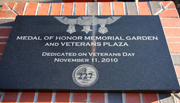War Related Illness and Injury Study Center
Brent Casey: A Veteran's Story
Brent Casey: A Veteran's Story

Brent Casey, president and cofounder of the Student Veterans of America Chapter 227 dedicates the Medal of Honor Garden and Veteran's Plaza at Sullivan University, Louisville, Kentucky on Veteran's Day, November 11, 2010.
Brent Casey was inspired at an early age to serve his country. His grandfather, a WWII Medal of Honor recipient, was his role model who taught him about discipline, work ethic, and selflessness. At the age of 19, Brent joined the Army to serve in the medical corps and was trained as a combat lifesaving medic. In October 1990, he was deployed to Saudi Arabia to support Operation Desert Shield/Desert Storm. During his deployment, Brent remained patient while focused on dealing with the fear of never knowing what the next minute would hold. During the air attack as his unit moved toward the Iraq border, Brent witnessed what he describes as "pure destruction."
When Brent returned from deployment in March 1991, there were a number of challenges he faced, such as readjusting, dealing with his marriage, and employment. As he continued to struggle personally and professionally, Brent saw himself on a "path of destruction." With the encouragement of his family, Brent visited his local Department of Veterans Affairs (VA) hospital. He was quickly diagnosed with posttraumatic stress disorder (PTSD) and, eventually, fibromyalgia. Finally, after almost 15 years, Brent was able to better understand why he had been struggling. When he received care in the VA hospital, he was able to learn tools to cope with his illness.
However, Brent also faced some medical challenges. He continued to suffer with pain, fatigue, and gastrointestinal symptoms. After receiving a letter from the Department of Defense that he was in the vicinity of Khamisiyah, leaving him curious about his possible exposure to sarin gas and whether that was linked to any of his health concerns. In searching for more answers, he was referred to the War Related Illness and Injury Study Center (WRIISC) in East Orange, New Jersey.
While at the WRIISC, Brent was struck by the comprehensiveness and highly personalized degree of the WRIISC evaluation. During his visit, the team of providers was able to diagnose him as having Myalgic Encephalomyelitis/Chronic Fatigue Syndrome (Systemic Exertion Intolerance Disease) (ME/CFS (SEID)) and irritable bowel syndrome, which finally explained many of his symptoms. An important part of his WRIISC evaluation was receiving information on how to better manage his symptoms. Specific recommendation for his conditions included new medications for pain management, graded exercise to combat fatigue, and dietary information to minimize gastrointestinal symptoms.
With his plans to return to school, Brent was worried whether his ability to concentrate and memory were impaired. His neuropsychological evaluation indicated that Brent was above average in attention and concentration skills, which reassured him and gave him the confidence to be able to return to school. Brent's questions about sarin were related to the possibility that there might be future health effects. Although the exposure assessment part of the evaluation was not able to answer all his concerns about future health effects from sarin gas, Brent left the WRIISC encouraged to better manage his health with the tools to help him get there.

A new black granite marker is inscribed with an image of the medals and the plaza's name.
While pursuing his PhD in strategic management, Brent served as president of the Student Veterans Association. As part of this group, he has helped raised funds to build a Medal of Honor Memorial Garden to honor Veterans. Brent continues to manage his symptoms but credits the WRIISC and the VA with helping him to learn strategies to minimize his symptoms and live a healthier and more productive life.
"I am an absolute firm believer that the WRIISC was instrumental in changing my life for the better. Through the knowledge about my own health and the suggestions for healthy coping skills I gained from the WRIISC team, I have gone on to do things in life I never thought possible." When asked if he would recommend other Veterans to WRIISC, he enthusiastically replied, "Absolutely, absolutely, absolutely. The evaluation provided is on a whole different level, and Veterans will gain the necessary health information to get better."



















